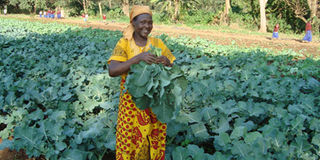Keep your vegetable garden fertile

A woman in a fertile vegetable garden.NET PHOTO
At times you want to plant vegetables in your garden but notice the soil is not that good. However, you do not have to give up on such a garden, there are a number of ways you can revive it and the double-dig system is one of them
According to Yokoyakim Omwodo Akanga, a farmer from Bira village, Lwala parish, Mulanda Sub-county in Tororo District, “With the double-dig system, identify the area where you will plant your vegetables and dig it two metres deep. Remove the soil and heap it aside.”
How it’s done
After removing the soil, you continue digging another one or two metres. “Get the compost from where you put it and spread it on the soil at the bottom of the pit you have dug. Then fill it with the soil you had heaped aside; and level it, ready for your vegetables,” Omwoda Akanga explains.
The farmer says, for the next three years, you need not change your kitchen garden from this patch to another.
You can use it every season, because the compost is already underneath. If your vegetable garden is big, you can dig adjacent patches beside the one with the compost. The purpose is to keep rotating your crops on the different patches, so that some can rest.
The patches neighbouring the composted patch must be about a metre away. The metre will act as paths, so as to avoid walking on the soft, composted patch and hardening it.
“When it rains, water will drain into the double-dug patch, because it will be soft. That is how you can keep growing and harvesting vegetables throughout the year.” Omwodo Akanga says.
Advantages
The advantages of applying your compost using the double-dug system are not limited to the longevity of soil fertility and year-round bounty harvests only. You don’t need to add any more fertilizer to the soil, particularly synthetic ones.
It means you and your family will enjoy fresh vegetables free of chemicals that can cause diseases. And if you were to sell, your produce would fetch higher prices in some health-sensitive communities that value organic produce.




